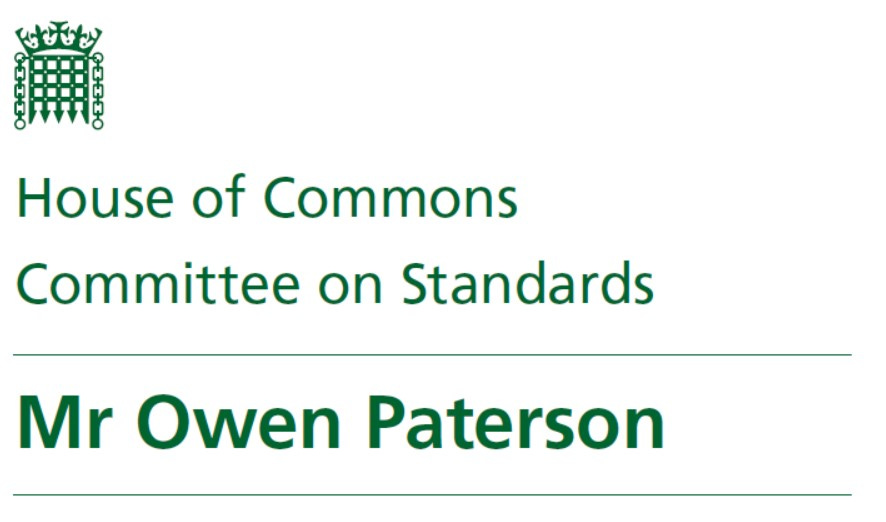When the public interest is no defence
Was Owen Paterson brought down by a failure to distinguish between what is proper and what is allowed?
When an innocent person is found guilty, it is natural to question whether the system is working properly. Owen Paterson was not an innocent man, but he seems to have convinced himself that he was and – for a while, at least – he persuaded the Conservative hierarchy that his case provided ammunition to criticise the Parliamentary Standards process.
The principles at issue are straightforward enough for most people to conclude that Paterson had done wrong. And yet the rules are complex enough for him to believe, fervently, that he had not and, worse, that the system had mistreated him. But it is not too difficult to pick one’s way through the conflicting arguments to see what lies within.
Whilst many people believe that being an MP should be a full-time commitment, with no other job on the side, the simple fact is that, if Cabinet Ministers can run the country and still find time to carry out their duties as MPs, the job of being an MP is plainly not a full-time role. Only this morning, on BBC’s Andrew Marr Show, Sir Keir Starmer (second job: leader of the Labour Party) was praising a Labour colleague for fitting in shifts as a doctor in Accident & Emergency alongside her duties as an MP.
Not all second jobs are equal – or equally acceptable. MPs are not allowed to be paid lobbyists for a client. That rule makes complete sense and, at first sight, it should be a blanket prohibition without exception. But what should happen if a client brings to an MP’s attention the existence of a serious harm they have discovered and which it would not only be of benefit to the public but also to the client for the matter to be acted upon?
Such situations have been recognised with a “serious wrong” exception to the ban on lobbying. The first of Paterson’s lobbying activities fell under that heading. It was permissible under the rules and he has been exonerated of any criticism over it. But it was also the start of a slippery slope.
MPs are used to campaigning for things to happen. It is natural for them to follow up on matters that they have raised. But the “serious harm” rule doesn’t allow for that. Having availed themselves of the exception to raise the matter, it seems that an MP must stop right there and not initiate any further attempts to progress the matter. (The word “initiate” is crucial: others may bring the matter to the MP, but the MP may not proactively raise the matter again.) Alternatively, the MP may release themselves from the restrictions by removing themselves from the client relationship and repaying the money received in the preceding six months.
Paterson followed neither of those two courses open to him. He considered it to be in the public interest to continue to address the matters he had initiated. He may well have been right about it being in the public interest, but there isn’t a “public interest” defence to an allegation of lobbying. And so Paterson found himself on the wrong side of the line and on receiving end of the following comment in paragraph 111 of the report by House of Commons Committee on Standards:
What might have been permissible in a single exceptional case, became Mr Paterson’s standard practice. It meant he repeatedly used his position as a Member to promote the companies by whom he was paid… It stretches credulity to suggest that fourteen approaches to Ministers and public officials were all attempts to avert a serious wrong … however much Mr Paterson may have persuaded himself he is in the right.
The Committee’s assessment that Paterson’s argument “stretches credulity” conveys a hint of derision which was uncalled for. It was no part of Paterson’s case that he was reporting fourteen separate matters. The Committee makes a much fairer assessment of his defence when they say (in paragraph 114) that his belief that “he was motivated by issues of public policy … appears to have misled Mr Paterson into thinking that he could not have breached the rules.”
This failure by Paterson to distinguish between his belief in what is right and what is actually allowed under the rules was revisited by the Committee when they said (in paragraph 207) that “Mr Paterson told us multiple times in oral evidence before us that he was elected for his judgment, and that he judged that he was right to make the approaches he did.” This defence sounds to me a lot like an argument borne out of desperation. Paterson must realise that he is not the only MP chosen for their judgment. The MPs on the Committee had a duty to exercise their own judgment and they clearly reached a different conclusion from him. On the basis of what I have read, they undoubtedly reached the right conclusion.
But I find it hard to reconcile Committee’s conclusion with the words they used to express it. Their report concludes (in paragraph 212) that “This is an egregious case of paid advocacy.” Unsurprisingly, those were the words that many news outlets chose to run with (for example, the BBC, the Guardian and the Times). But the report, taken as a whole, really doesn’t support the use of “egregious” (synonyms: shocking, appalling) and the Committee’s choice of punishment – suspension for 30 days – certainly does not fit with that description, given that they cited precedents which include a six-month suspension.
Share this thought with others and subscribe now to be notified of future Irregular Thoughts.




